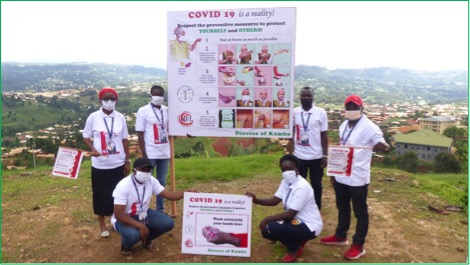Presence in the Periphery
Clearly, the COVID-19 pandemic is making our social-political crisis even more complex.
Since November 2016, we have been enduring the instability and uncertainty of our very future, especially that of our school-aged children. Indeed, since the first general strike in November 2016, our schools have remained closed. Families who have the means or who have relatives in the French regions of the country have enrolled their children in bilingual schools. For security measures, almost all public servants in our region have also moved – about 60% of our population.
The families who have stayed behind are those who make a living from day to day by running small businesses, selling beignets to school children, selling products from their farms, working as neighbourhood mechanics, running small restaurants in the area, and by other means that enable them to live simple yet respectable lives.
Needless to say, the social-political crisis affects the ENTIRE country. For many days and months, we have been living in a Ville Morte, a ghost town, where there is no movement, no commerce, and no money circulation.
Our hospitals have remained open but receive few patients for lack of money. Even the funerals of our loved ones, a sacred rite, cannot be observed because of the insecurity caused by the armed conflict. What about our idle youth at home or in the village? Families whose members have died violently? Homes burned and destroyed during the crisis?
Before the COVID-19 pandemic, through pastoral ministry and the Bureau de Justice et Paix, we were available to all those in mourning: attending the daily 6:00 a.m. Mass, collaborating with NGOs by bringing help to villages and providing staples to families, bringing communion to the sick, continuing the Apostolat de la Famille, Apostolate of the Family, and greeting people on our path.
While COVID-19 slows us down, many countries have proven that containment is the best way of fighting the pandemic. Unfortunately, Cameroon’s social-economic policies make it difficult to effectively implement this strategy. Unemployment benefits do not exist and the government cannot provide meal-baskets to the majority of the population, including that of the Diocese of Kumbo, who live in the informal sector, especially those who mostly subsist on small business. This is one of the reasons why, unlike other African and European countries, confinement is not strictly enforced.
Apart from chloroquine, that is already in use by some doctors, it has been officially announced that Most Reverend Samuel Kléda, Archbishop of Kumbo and a naturopathic doctor, has found a medicine that relieves patients suffering from COVID-19. We pray for this treatment to be effective and officially recognized as a viable product. The truth is that from a social-economic standpoint, Cameroon is not ready to face COVID-19. (For more details, see the mini-project by Falie and her colleagues).
Another matter of concern for Falie and her colleagues is bringing relief to the many people in the Diocese of Kumbo suffering from trauma. More details can be found in the excerpt from a project-outline on which they are currently reflecting.
During these difficult times, we intentionally focus on the quality of our presence, our listening and our compassion. In order to reduce the stress that we all live in spite of ourselves, we have opened a music class and built a sports field. Everyone is invited: women, men, young people, children, men and women religious, and priests.
The rainy season has arrived! Seeds have been sown and the earth is beginning to germinate and grow. All the new shoots of corn, beans, macabo, yam, plantain, etc. renew our hope for better days. When the sun rises at 5:45 a.m., it is radiant!
